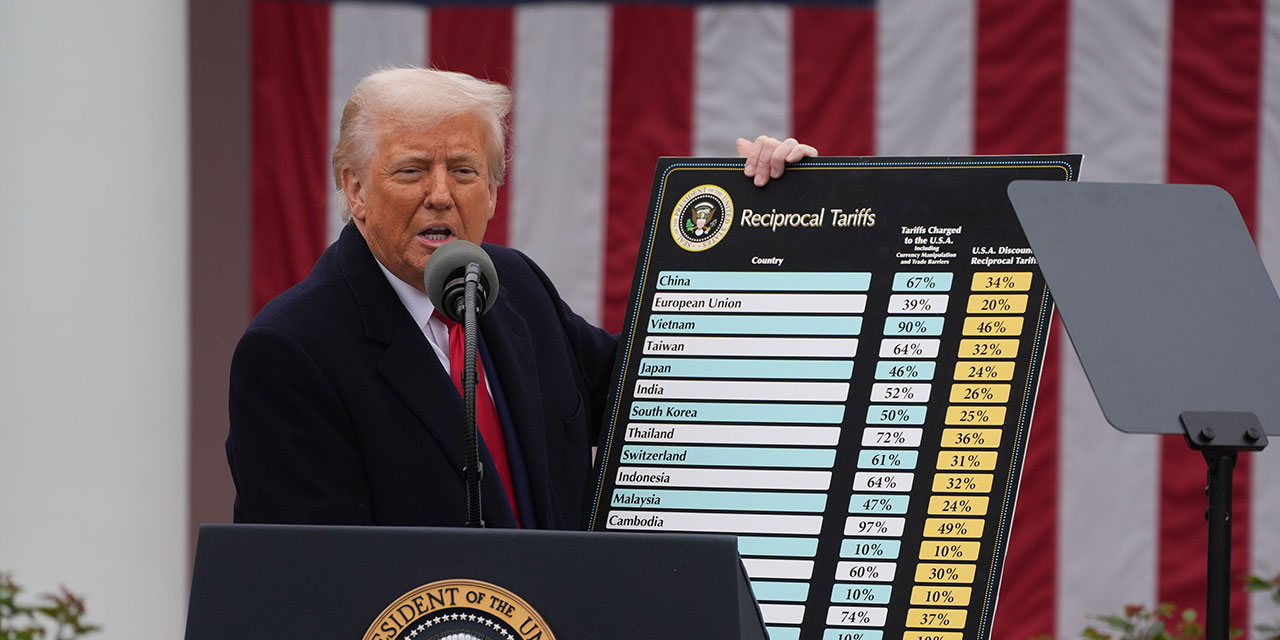
President Trump’s latest round of tariffs is generating considerable anxiety about the economy. Free trade proponents warned that this would happen—but now is not the time to gloat.
Supporters of freer trade won’t get a seat at the table until they take Trump’s trade concerns seriously. Trump’s commitment to tariffs despite deteriorating economic conditions makes clear that short-term economic prosperity is not his top priority. He wants something else—security commitments from other nations, more U.S. manufacturing jobs, lower barriers to U.S. exports—and he thinks tariffs are the way to accomplish these objectives, even if they cause some short-term discomfort.
Finally, a reason to check your email.
Sign up for our free newsletter today.
There are good reasons to disagree with his view, but to be effective, any critique of Trump’s plan should include an alternative one that helps him attain his goals.
Take national security. Trump is clearly worried about the impact that U.S.–China trade has in this area. Many Americans share his concern: in one poll, a majority say trade with China does more to weaken national security than strengthen it. If proposed trade policies don’t address the threat China poses, Trump and many Americans will reject them.
Fortunately, it’s possible both to expand trade and enhance our security. Developing deeper trade relationships with friendly nations would make our supply chains more resilient and expand the market for U.S. exports.
Deeper trade relationships with allies would also help us combat China. Like the United States, other countries want to sell their goods and services internationally. If we buy more of their goods and services than China does, we will curtail Chinese influence over them and increase our own.
Free traders should also be more willing to discuss the strategic use of tariffs and export controls. Those tools have drawbacks, but if targeted at the countries and products that present the biggest threats, they can help achieve national security goals with minimal economic damage. Clarifying which countries and products Trump should target, and how, is more challenging than insisting on unfettered trade. But it is worth doing if free traders want more global trade in a world where national security concerns have grown in importance.
If we take Trump at his word, his plan to use tariffs to encourage other countries to remove non-tariff trade barriers also has merit. The European Union imposes several barriers on agricultural and food imports from the United States, including labeling requirements, restrictions on genetically modified crops, and ingredient approvals. These barriers hinder trade in ways deemed unfair by the Office of the United States Trade Representative. Promoters of freer trade should offer detailed plans for how to reduce such barriers without relying on tit-for-tat tariffs.
As for reinvigorating U.S. manufacturing, the best place to start is at home. Cutting red tape, reforming the tax code, unleashing American energy production, and creating better pathways for workers to gain the right skills will do far more to boost U.S. manufacturing than any tariffs. Experts forecast a shortage of nearly 2 million manufacturing workers by 2033. Tariffs won’t close this gap.
A core message of free traders should be that the best way to boost businesses in America is to make the U.S. the best place to do business. Many states are already acting to do so. Several years ago, Idaho dramatically reduced its regulatory burden to make it easier to start and operate a business. Last year, Arkansas, Georgia, and Kansas slashed tax rates and simplified their tax codes.
The Trump administration is trying to follow their lead, pushing for tax and regulatory reforms. Free traders could do a better job showing how these and other domestic pro-growth policies make most tariffs unnecessary.
Cutting government spending is another strong pro-growth policy. Lower taxes will encourage work and investment, but we also need to reduce spending so that government debt doesn’t crowd out private investment. Republicans in Congress worried about tariff-inflicted damage should emphasize that cutting spending will reduce tariffs’ negative effects.
Trump is more suspicious of global trade than any president in decades, but he also promised to boost economic growth and reduce prices. His current trade policies work against both aims and are also upsetting voters. This is an opportunity for supporters of freer trade to show how a different approach—one that expands trade with allies and uses tariffs tactically—can help the president realize both his economic and national security objectives.
Photo by Demetrius Freeman/The Washington Post via Getty Images
City Journal is a publication of the Manhattan Institute for Policy Research (MI), a leading free-market think tank. Are you interested in supporting the magazine? As a 501(c)(3) nonprofit, donations in support of MI and City Journal are fully tax-deductible as provided by law (EIN #13-2912529).
Source link
















